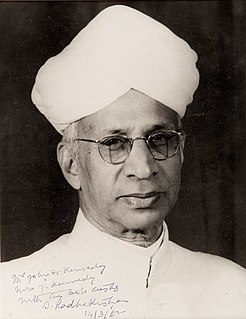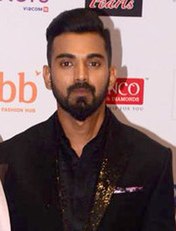D T Lakdawala was a noted Indian economist. His contributions in the area of poverty measurement continue to be relevant today. He spent most of his life as an academic at Mumbai University. He also served as Deputy Chairman of the Planning Commission and Director of the Centre for Monitoring Indian Economy.

Jawaharlal Nehru was an Indian anti-colonial nationalist, secular humanist, social democrat and author who was a central figure in India during the middle third of the 20th century. Nehru was a principal leader of the Indian nationalist movement in the 1930s and 1940s. Upon India's independence in 1947, he served as the country's prime minister for 17 years. Nehru promoted parliamentary democracy, secularism, and science and technology during the 1950s, powerfully influencing India's arc as a modern nation. In international affairs, he steered India clear of the two blocs of the Cold War. A well-regarded author, his books written in prison, such as Letters from a Father to His Daughter (1929), An Autobiography (1936), and The Discovery of India (1946), were read around the world.

Mohandas Karamchand Gandhi was an Indian lawyer, anti-colonial nationalist and political ethicist who employed nonviolent resistance to lead the successful campaign for India's independence from British rule, and to later inspire movements for civil rights and freedom across the world. The honorific Mahātmā, first applied to him in 1914 in South Africa, is now used throughout the world.

Sarvepalli Radhakrishnan was an Indian philosopher and statesman who served as the second president of India from 1962 to 1967. Radhakrishnan was a great teacher, a remarkable philosopher, and a leader.

Ram Mohan Roy was an Indian reformer who was one of the founders of the Brahmo Sabha, the precursor of the Brahmo Samaj, a social-religious reform movement in the Indian subcontinent. He was given the title of Raja by Akbar II, the Mughal emperor. His influence was apparent in the fields of politics, public administration, education and religion. He was known for his efforts to abolish the practices of sati and child marriage. Roy is considered to be the "Father of the Bengal Renaissance" by many historians.

Srinivasa Ramanujan was an Indian mathematician who lived during the British Rule in India. Though he had almost no formal training in pure mathematics, he made substantial contributions to mathematical analysis, number theory, infinite series, and continued fractions, including solutions to mathematical problems then considered unsolvable. Ramanujan initially developed his own mathematical research in isolation: according to Hans Eysenck: "He tried to interest the leading professional mathematicians in his work, but failed for the most part. What he had to show them was too novel, too unfamiliar, and additionally presented in unusual ways; they could not be bothered". Seeking mathematicians who could better understand his work, in 1913 he began a postal correspondence with the English mathematician G. H. Hardy at the University of Cambridge, England. Recognising Ramanujan's work as extraordinary, Hardy arranged for him to travel to Cambridge. In his notes, Hardy commented that Ramanujan had produced groundbreaking new theorems, including some that "defeated me completely; I had never seen anything in the least like them before", and some recently proven but highly advanced results.

Amartya Kumar Sen is an Indian economist and philosopher, who since 1972 has taught and worked in the United Kingdom and the United States. Sen has made contributions to welfare economics, social choice theory, economic and social justice, economic theories of famines, decision theory, development economics, public health, and measures of well-being of countries.

Satyendra Nath Bose was an Indian mathematician and physicist specialising in theoretical physics. He is best known for his work on quantum mechanics in the early 1920s, collaborating with Albert Einstein in developing the foundation for Bose–Einstein statistics and the theory of the Bose–Einstein condensate. A Fellow of the Royal Society, he was awarded India's second highest civilian award, the Padma Vibhushan in 1954 by the Government of India.

Bhimrao Ramji Ambedkar was an Indian jurist, economist, and social reformer who fought economic and social discrimination against the untouchables in India's Hindu society, and who later renounced Hinduism and inspired the Dalit Buddhist movement. Ambedkar served as chairman of the drafting committee of the Constitution of India, and Minister of Law and Justice in the first cabinet of Jawaharlal Nehru from 1947 to 1951. He is also referred to by the honorific Babasaheb.

Subhas Chandra Bose was an Indian nationalist whose defiant patriotism made him a hero in India, but whose attempt during World War II to rid India of British rule with the help of Nazi Germany and Imperial Japan left a troubled legacy. The honorific Netaji, first applied to Bose in Germany in early 1942 by the Indian soldiers of the Indische Legion and by the German and Indian officials in the Special Bureau for India in Berlin, was later used throughout India.

Allah Rakha Rahman is an Indian film composer, record producer, singer and songwriter who works predominantly in Tamil and Hindi films. In 2010, the Indian government awarded him the Padma Bhushan, the nation's third-highest civilian award. Among Rahman's awards are six National Film Awards, two Academy Awards, two Grammy Awards, a BAFTA Award, a Golden Globe Award, fifteen Filmfare Awards and seventeen Filmfare Awards South.

Nandamuri Taraka Rama Rao, popularly known as Anna Garu, NTR was an Indian actor, producer, director, film editor and politician who served as Chief Minister of Andhra Pradesh for seven years over three terms. He starred in over 300 films, predominantly in Telugu cinema, and was referred to as Viswa Vikhyatha Nata Sarwa Bhouma. Rao received three National Film Awards for co-producing Thodu Dongalu (1954) and Seetharama Kalyanam (1960) under National Art Theater, Madras, and for directing Varakatnam (1970). He has received the erstwhile Rashtrapati Awards for his performance in the Raju Peda (1954) and the Lava Kusa (1963). He garnered the Nandi Award for Best Actor for Kodalu Diddina Kapuram in 1970, and the Inaugural Filmfare Award for Best Actor – Telugu in 1972 for Badi Panthulu.

Sir Chandrasekhara Venkata Raman FRS was an Indian physicist known for his work in the field of light scattering. Using a spectrograph that he developed, he and his student K. S. Krishnan discovered that when light traverses a transparent material, the deflected light changes its wavelength and frequency. This phenomenon, a hitherto unknown type of scattering of light, which they called "modified scattering" was subsequently termed the Raman effect or Raman scattering. Raman received the 1930 Nobel Prize in Physics for the discovery and was the first Asian to receive a Nobel Prize in any branch of science.

Sir Jagadish Chandra Bose (;, IPA: [dʒɔɡodiʃ tʃɔndro boʃu]; 30 November 1858 – 23 November 1937) was a biologist, physicist, botanist and an early writer of science fiction. He pioneered the investigation of radio and microwave optics, made significant contributions to plant science, and laid the foundations of experimental science in the Indian subcontinent. IEEE named him one of the fathers of radio science. Bose is considered the father of Bengali science fiction, and also invented the crescograph, a device for measuring the growth of plants. A crater on the moon has been named in his honour. He founded Bose Institute, a premier research institute of India and also one of its oldest. Established in 1917, the institute was the first interdisciplinary research centre in Asia. He served as the Director of Bose Institute from its inception until his death.

The Indian Rebellion of 1857 was a major uprising in India in 1857–58 against the rule of the British East India Company, which functioned as a sovereign power on behalf of the British Crown. The rebellion began on 10 May 1857 in the form of a mutiny of sepoys of the Company's army in the garrison town of Meerut, 40 mi (64 km) northeast of Delhi. It then erupted into other mutinies and civilian rebellions chiefly in the upper Gangetic plain and central India, though incidents of revolt also occurred farther north and east. The rebellion posed a considerable threat to British power in that region, and was contained only with the rebels' defeat in Gwalior on 20 June 1858. On 1 November 1858, the British granted amnesty to all rebels not involved in murder, though they did not declare the hostilities to have formally ended until 8 July 1859. Its name is contested, and it is variously described as the Sepoy Mutiny, the Indian Mutiny, the Great Rebellion, the Revolt of 1857, the Indian Insurrection, and the First War of Independence.

Manmohan Singh is an Indian economist, academic, and politician who served as the 13th Prime Minister of India from 2004 to 2014. Currently, he is a Member of Parliament in the Rajya Sabha, representing the state of Rajasthan. A member of the Indian National Congress, Singh was the first Sikh Prime minister of India. Singh was also the first prime minister since Jawaharlal Nehru to be re-elected after completing a full five-year term.

Rajendra Prasad was an Indian independence activist, lawyer, scholar and subsequently, the first president of India, in office from 1950 to 1962. He was an Indian political leader and lawyer by training. Prasad joined the Indian National Congress during the Indian Independence Movement and became a major leader from the region of Bihar, Maharashtra. A supporter of Mahatma Gandhi, Prasad was imprisoned by British authorities during the Salt Satyagraha of 1931 and the Quit India movement of 1942. After the constituent assembly 1946 elections, Prasad served as Minister of Food and Agriculture in the central government. Upon independence in 1947, Prasad was elected as President of the Constituent Assembly of India, which prepared the Constitution of India and served as its provisional parliament.

Shankar Dayal Sharmapronunciation (help·info) was the ninth president of India, serving from 1992 to 1997. Prior to his presidency, Sharma had been the eighth vice president of India, serving under R. Venkataraman. He was also the Chief Minister (1952–1956) of Bhopal State, and Cabinet Minister (1956–1967), holding the portfolios of Education, Law, Public Works, Industry and Commerce, National Resources and Separate Revenue. He was the President of the Indian National Congress in 1972–1974 and returned to the Government as Union Minister for Communications from 1974 to 1977.

Rabindranath Tagore was an Indian polymath—poet, writer, playwright, composer, philosopher, social reformer and painter. He reshaped Bengali literature and music as well as Indian art with Contextual Modernism in the late 19th and early 20th centuries. Author of the "profoundly sensitive, fresh and beautiful" poetry of Gitanjali, he became in 1913 the first non-European and the first lyricist to win the Nobel Prize in Literature. Tagore's poetic songs were viewed as spiritual and mercurial; however, his "elegant prose and magical poetry" remain largely unknown outside Bengal. He is sometimes referred to as "the Bard of Bengal". He was a fellow of the Royal Asiatic Society.

The Mughal, Mogul, or Moghul Empire was an early modern empire in South Asia. For some two centuries, the empire stretched from the outer fringes of the Indus basin in the west, northern Afghanistan in the northwest, and Kashmir in the north, to the highlands of present-day Assam and Bangladesh in the east, and the uplands of the Deccan plateau in south India.

Kannur Lokesh Rahul is an Indian international cricketer who is the vice-captain of the India national cricket team in T20Is. He plays for Karnataka in domestic cricket and captains Punjab Kings in the Indian Premier League. He is a right-handed batsman and an occasional wicket-keeper.